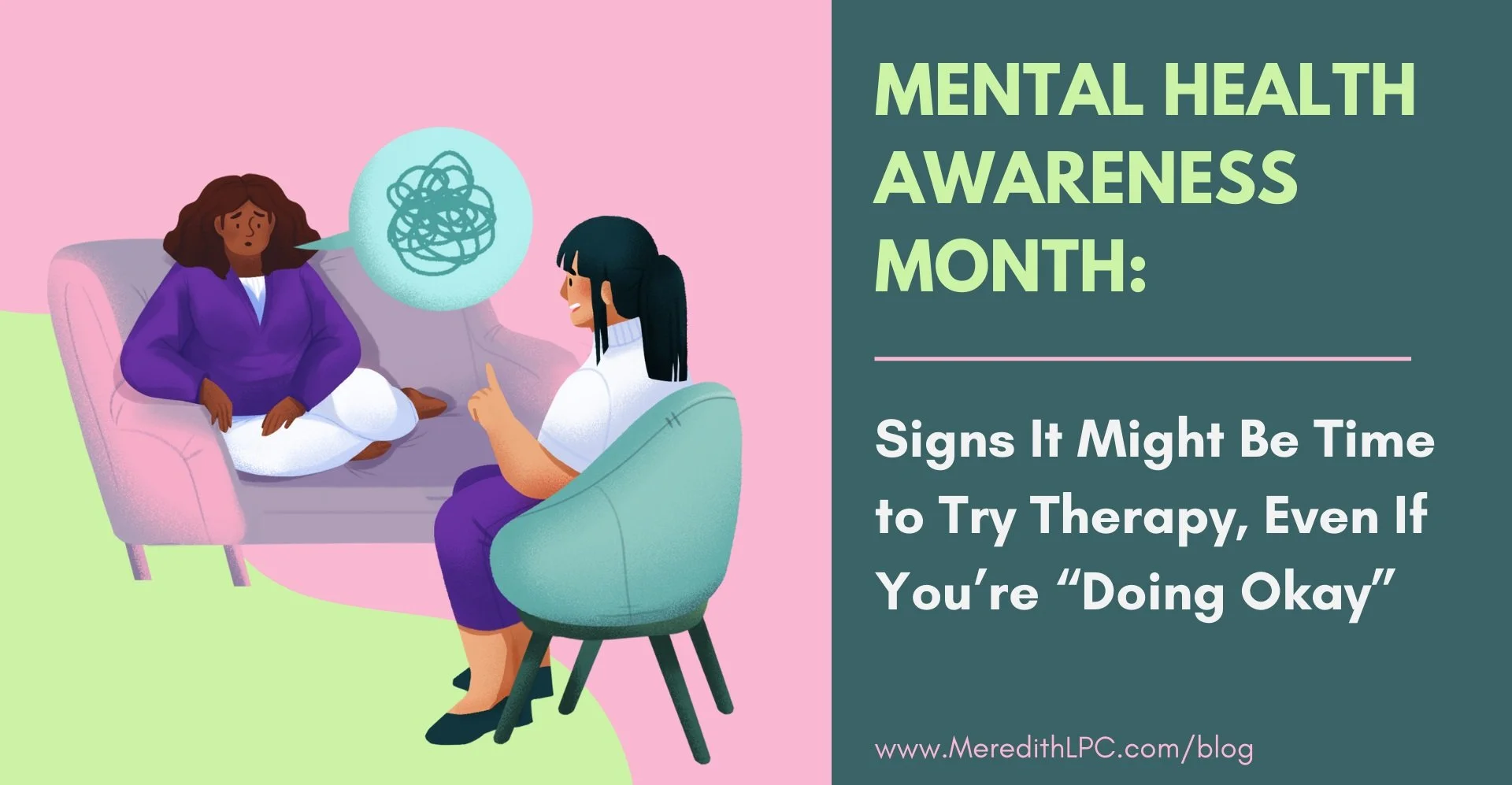Mental Health Awareness Month: Signs It Might Be Time to Try Therapy—Even If You’re “Doing Okay”
May is Mental Health Awareness Month, which makes it the perfect time to pause and check in with ourselves. While therapy is often seen as something people pursue when they’re in crisis, the truth is that you don’t have to be falling apart to benefit from it. In fact, some of the most powerful therapy work happens when people are functioning “just fine” on the outside—but know there’s something more they want for themselves on the inside.
So how do you know if therapy might be a good idea, even if your life looks pretty stable?
Here are some signs to consider:
1. You're constantly overwhelmed or emotionally drained
You might be holding everything together at work, parenting well, managing your responsibilities—but inside, you feel like you’re one small inconvenience away from shutting down. Maybe you’re not crying every day, but you're mentally exhausted, easily irritated, or find yourself zoning out or doom-scrolling just to get through the day.
Therapy can help you understand the root causes of your overwhelm, set better boundaries, and build coping strategies that work for you, not just ones that look good on paper.
2. You’re stuck in the same patterns, over and over again
Ever notice that you keep having the same kind of conflict in different relationships? Or that you self-sabotage when things are going well? Maybe you’re great at giving advice to others—but struggle to take your own.
These aren’t flaws—they’re often deep-seated patterns that therapy can help you recognize and shift. You don’t need a crisis to explore this; just curiosity and a willingness to dig deeper.
3. You feel numb, bored, or disconnected
You’re not unhappy, exactly, but you're also not feeling much of anything. Life feels like it’s happening to you rather than with you.
Therapists often hear people say, “I have nothing to complain about, but I feel kind of... meh.” This emotional flatness is important information. Therapy can help you reconnect with your own sense of meaning, values, and joy.
4. Your coping strategies aren’t working like they used to
Maybe you used to manage stress with a run or a vent session with a friend, but now those things don’t seem to help. Or maybe you’ve started relying more heavily on avoidance, alcohol, overworking, or numbing behaviors that don’t really feel good anymore.
You don’t need to hit rock bottom to explore better options. Therapy offers a nonjudgmental space to reassess and realign.
5. You want to improve your relationships
Even when life is going smoothly, you might notice tension in a relationship—with a partner, parent, friend, or coworker. Or maybe you want to improve your communication, be more assertive, or learn to set healthy boundaries.
Therapy isn’t just about solving problems—it’s about growing your skills and self-awareness to create stronger, more authentic connections.
6. You’re navigating a life transition
Big changes—even exciting ones—can stir up stress, self-doubt, and unexpected emotions. Whether you’re starting a new job, becoming a parent, getting divorced, moving, or reevaluating your life direction, therapy gives you a place to sort through the “now what?” feelings and move forward with intention.
7. You’re curious about yourself
That’s right—you don’t need a “problem” to go to therapy. Maybe you’re interested in better understanding your past, exploring your identity, or becoming more mindful of how you respond to life. Therapy can be a powerful tool for self-growth and self-compassion, not just symptom relief.
So… Do You Need to Hit a Breaking Point?
Absolutely not.
In fact, waiting until you’re at your limit can make the process more overwhelming. One of the healthiest things you can do is reach out before things get unmanageable. Just like you might see a personal trainer to stay strong or a financial advisor to plan ahead, a therapist can support your mental and emotional wellness proactively.
What Therapy Can Look Like:
Weekly or biweekly check-ins
Short-term support during transitions
Long-term personal growth work
A mix of talking, skill-building, goal setting, and reflection
A safe space to bring all parts of yourself—without judgment
Final Thoughts
This Mental Health Awareness Month, give yourself permission to consider therapy not as a last resort, but as a form of self-care, exploration, and investment in your future.
Even if you're "doing okay," you might be ready for more than just okay.
And that's a great reason to start.
If you're curious about working with a therapist or want help finding the right fit, reach out. You're not alone, and you don't have to wait for a crisis to take care of your mental health.
Related Articles: What to Expect From Your First Therapy Session
Mental Health Awareness Month: How to Support a Friend or Loved One Who’s Struggling
Mental Health Awareness Month: How I Care for My Own Mental Health as a Therapist
Mental Health Awareness Month: What Mental Health Looks Like Across the Lifespan
Mental Health Awareness Month: Considerations for Developing a Routine to Support Your Mental Health


